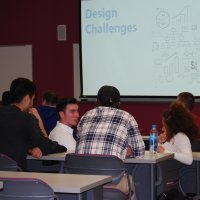
About 100 iCons scholars and applicants gathered in the Integrative Learning Center of UMass Amherst on Nov 9, 2017 for the annual iCons Fall Integrative Workshop. They came to hear Dr. Jonathan Thon tell the story of how his start-up company Platelet Biogenesis came to be. Integrated Concentration in Science (iCons) Program Director Justin Fermann introduced Thon to the crowd, telling the iCons students “we are here because we have work to do, and he’s got some problems we need to solve.”
Not only did Thon demonstrate the importance of drawing from different scientific fields to solve a problem, but he also revealed his belief that dedication is as important as knowledge.
“What has kept me going is this idea that the future of medicine is regenerative medicine, this idea that we are going to be transplanting organs from one person to another, taking platelets from one person to another,” Thon said, “we’ve been doing that for hundreds of years, it’s stone age technology. So, it makes complete sense to me that the next big breakthrough will involve making organs.”
Thon started Platelet Biogenesis to eliminate the need for blood donors and to insure timely access to safe blood for all.
When donors give blood, the part that repairs the body are the platelets. These disk-shaped cell fragments are the reason your blood clots.
The problem with these Band-Aids of the blood stream is their short shelf life. They have only a five-day life cycle, two of which are spent checking the donation for disease and one of which is spent shipping. Because of this, 20 percent of all donated platelets are thrown away.
The solution is finding a way to effectively grow healthy platelets that can be administered to patients right away. But this is easier said than done.
In order to grow a steady line of platelets, two things must happen: first, there needs to be a steady line of cells. This can be accomplished by using embryonic stem cells, but this solution raises ethical concerns.
Secondly, the costs need to come down; platelets are expensive to make and therefore not accessible to every socioeconomic class.
Thon spent the majority of his academic career studying the issue of platelets. When he realized the risk was too high for pharmaceutical companies to try his theory, he took a leap of faith and started Platelet Biogenesis. Unable to afford the lab space, Thon started in his kitchen.
“Nobody here was getting paid, I had zero money. The perks were pizza and beer, and that was still expensive for me,” Thon said.
By 2017, Platelet Biogenesis had 15 scientists on their team.
“And that was the easy part,” Thon said.
Thon and the Platelet Biogenesis team have faced a number of design challenges while trying to discover a way to engineer platelets outside of the human body. Some of these issues include testing how their platelets will react in the human body, and ways to accurately mimic the human body system in an experimental setting. Thon presented these issues to the iCons audience.
Like iCons, Thon sees value in collaboration between different scientific disciplines.
“All of the major physical problems we are facing in cell biology were solved 1,000 years ago in mathematics and physics,” Thon said, “and what you need is someone to actually bother to just go to the office next door and pose the exact same question to a physics professor or a math professor.”
Because of this idea, Thon also sees a value in the way iCons encourages these interactions.
“I think this structure is important because bringing these different groups together where one group identifies a major challenge and another group has the solution for something else, but could work here,” Thon said.
![]() By collaborating with each other and looking at the issue from different points of view, the iCons members and applicants were able to come up with a number of solutions. They ranged from a microbiologist's solution to alter the growth medium for the cells to that of a physicist: changing the flow rate of platelets through the blood stream.
By collaborating with each other and looking at the issue from different points of view, the iCons members and applicants were able to come up with a number of solutions. They ranged from a microbiologist's solution to alter the growth medium for the cells to that of a physicist: changing the flow rate of platelets through the blood stream.
After examining the board and the ideas iCons students came up with, Thon smiled and said, “this is remarkable, I should just hire you guys.”
He went on to explain that his company’s set-up does incorporate many different fields of science, from biomedical engineering to animal behavior science.
Still, as important as it is to learn from other scientific disciplines, Thon also believes he could not have made the same progress without the scientists before him.
“All the same questions we are asking ourselves now aren’t challenges we are just identifying today. They are challenges that were identified in the 1900s. A lot of people forget that. But if you look, some of the same questions that were proposed and the answers that they arrived at are the answers of how it should be done, and then people forgot about it. So, if you are not a student of history, you are failed to repeat it.”
Even so, for Thon, Platelet Biogenesis is not only about coming up with a global solution for personal gain. It is about making a beneficial impact on the science field.
He said, “Even if we fail, we’ll have pushed the boulder up a little bit and at least make it easier for somebody else.”
---Natalie Didomenico
Stay Connected